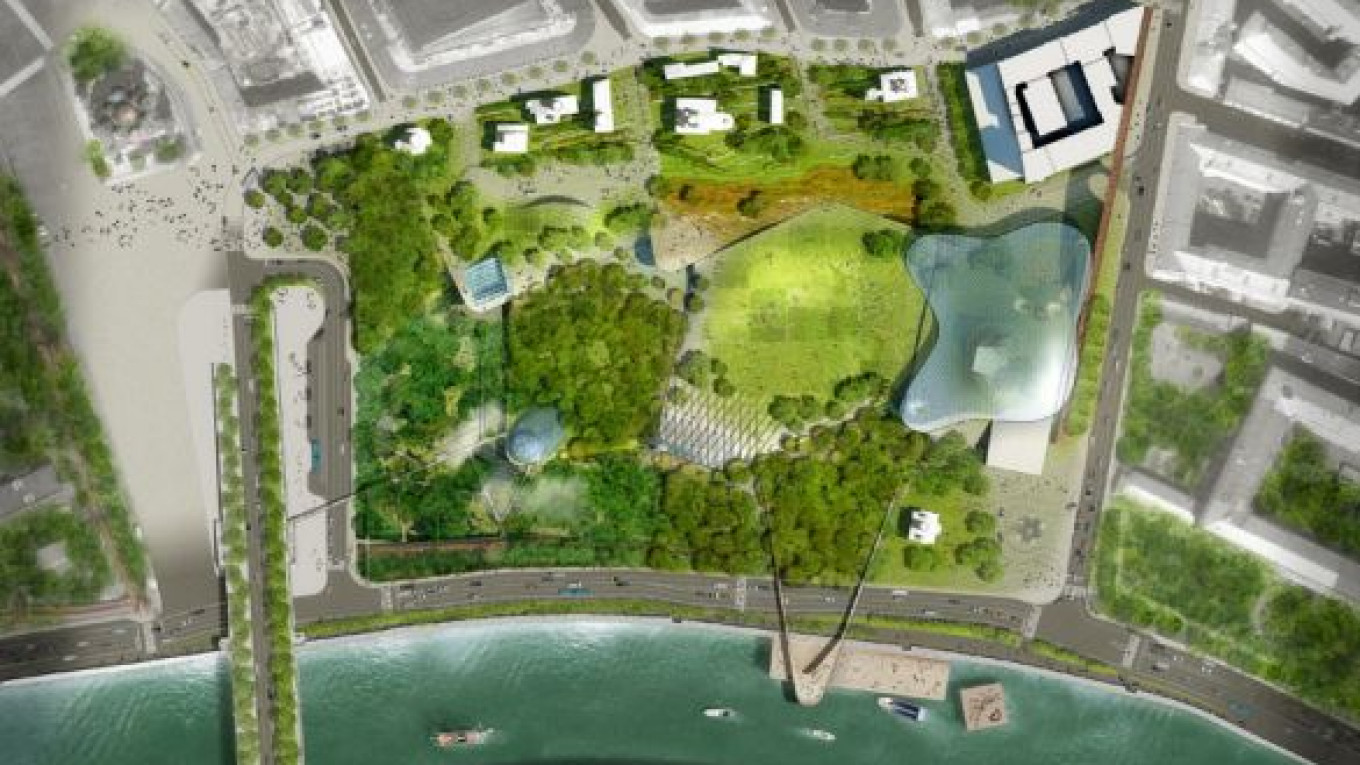The announcement of the winning plan for the planned Zaryadye park was thought to put an end to years of speculation about the empty land left by the demolition of the Rossiya Hotel. However, architectural preservation watchdog Arkhnadzor has expressed their disapproval with the selected plan, despite previously lobbying for the creation of a park.
"In our opinion, the winning project, like other runner-up projects, cannot be realized without serious corrections," said Arkhnadzor in a statement posted last week to their website.
One of the few remaining undeveloped areas in the center of Moscow, Zaryadye was historically a residential and commercial neighborhood before it was largely destroyed in the mid 20th century to make way for the construction of the Bolshoi Zamoskvoretsky Bridge and the Rossiya Hotel, one of the largest hotels in the world.
The Rossiya Hotel was demolished in 2006, yet plans to create office or residential developments on the site made little progress, and the area remained empty. In 2012, President Vladimir Putin suggested to Moscow Mayor Sergei Sobyanin that the site be made into a new park.
A contest held this year to design the new park was won in November by Diller Scofidio + Renfro, a New York-based design firm that previously designed the High Line elevated park in Manhattan. The design aims to bring natural environments into the city, dividing the territory into four typical landscape zones — tundra, steppe, forest and marsh.
Arkhnadzor conceded that it had "supported the idea of a park on the site from the very beginning," yet said that the projects in the contest all "entirely ignored the historic territories of the surviving architectural monuments of Zaryadye."
The group said a better plan would try to restore territories like the Old English Court and Znamensky Monastery to their historical appearance, while the present plan would leave them in the same diminished configuration created by the construction of the Rossiya Hotel. Arkhnadzor also called for the routes of historic streets like Maly Znamensky Pereulok and Mokrinsky Pereulok to be incorporated into the new design, rather than creating a new system of pedestrian paths.
Far from restoring Zaryadye to its historical scheme, Arkhnadzor said the proposed park in fact overlooked many features of the existing landscape, incorrectly plotting the path of the Kitai-Gorod wall and ignoring the path of the historic Velikaya Ulitsa right-of-way, which is still visible.
While the winning plan in fact does include a plan to restore the historic pier on the Moscow River, Arkhnadzor says this restoration will fall short and feel disconnected unless the historic paths that led to the river are restored along with it.
Arkhnadzor close their statement with three demands for the developers, saying that they must bring the project into accordance with laws and zoning rules regulating development on the protected territory of the Moscow Kremlin; ensure that the completed project reflects the historic landscape of Zaryadye; and carry out a thorough archaeological investigation of the territory prior to construction.
As of yet, no response has been made to Arkhnadzor's statement by city government or Diller Scofidio + Renfro.
The current design for the park is estimated to cost about $200 million, and city government hopes for it to be completed in two or three years. It will be the first park constructed in Moscow in more than 50 years.
Contact the author at [email protected]
A Message from The Moscow Times:
Dear readers,
We are facing unprecedented challenges. Russia's Prosecutor General's Office has designated The Moscow Times as an "undesirable" organization, criminalizing our work and putting our staff at risk of prosecution. This follows our earlier unjust labeling as a "foreign agent."
These actions are direct attempts to silence independent journalism in Russia. The authorities claim our work "discredits the decisions of the Russian leadership." We see things differently: we strive to provide accurate, unbiased reporting on Russia.
We, the journalists of The Moscow Times, refuse to be silenced. But to continue our work, we need your help.
Your support, no matter how small, makes a world of difference. If you can, please support us monthly starting from just $2. It's quick to set up, and every contribution makes a significant impact.
By supporting The Moscow Times, you're defending open, independent journalism in the face of repression. Thank you for standing with us.
Remind me later.






